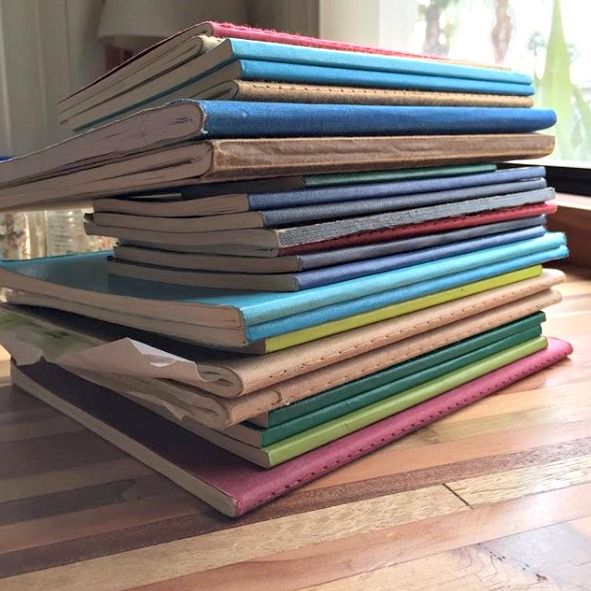I’ve been consistently journaling for 25 years now. I have no doubt that this has been the most important habit in my life that helps me stay sane (or at least return to sanity when stress, confusion, or circumstances knock me down).
This is what I think is most important about journaling: find what works for you. What do you want to get out it? That’s really all that matters.
When I boil it down to the simplest reason for me, I journal because I like how it makes me feel. I look forward to how I know I’ll feel when I’m done.
For me, the many benefits of regular journaling include:
• It helps me recognize patterns in desires, longings, and values that help me direct the course of my life.
• It helps me identify consistent causes of stress that need attention so I can look for ways to make effective change.
• It helps me slow down, pay attention, be more present, and mindful. This is simply because that’s what a writing habit has done for me, not necessarily because I’m thinking of how I’ll record something later.
• It helps me remember meaningful moments, activities, milestones, and trips.
• I really value the clarity that comes for me when I know what I feel, what I think, what matters to me. And journaling helps me articulate that to myself.
• It boosts my daily mood, fills me with gratitude, helps me have perspective on my life and challenging situations.
• It makes me feel less frantic because of the internal clarity.
• Creativity! Writing down ideas, fragments of ideas, bits and bobs that may never be anything. I know that this practice strengthens and bolsters my creativity, problem-solving, and strategic thinking.

I enjoy the simple pleasure of writing, deciding which word to use, challenging myself to describe how I feel more specifically, and the actual physical sensation of pen on paper is a delight.
Although the basic habit of sitting down with pen and paper has been consistent for decades, the style and structure of writing vary for me dramatically. And I’m not just talking about how I wrote when I was 15 years old compared to 30 years old.
When I sit down with my journal, I’m subconsciously asking myself, “what do I need today?” And then I move to meet that need in a variety of ways.
Most often, I already have something pressing on my mind and what I need is to simply process it and articulate it. But, other times, my answer to the question is that I need to focus on things I’m thankful for, so I make a gratitude list.
Or perhaps, I’m feeling discouraged, so I need to celebrate accomplishments and growth. If that’s the case, maybe I’ll make a list of gold stars for myself for the week, healthy habits I’ve kept, moments I’ve acted according to my values with my children or friends.
Maybe I’ve been spiraling with negative thoughts, in which case I make a list of what I call “true things,” to help me refocus (it’s my own adaption of “affirmations” that I’ve seen other people do). Sometimes what I need is the creative outlet so I draft a poem or a bit of dialog to save for a short story idea.
Although I have a desired outcome in mind when I start to write, I allow myself a lot of variety in how I reach that outcome.
This is something I’ve found extremely effective for me in many healthy habits: variation in the context of consistency. It combines the satisfaction of ritual with the freedom I need to keep it feeling fresh and fun. For me this applies to exercise, household chores, cooking routines, and more.

I don’t journal with anyone else in mind.
I don’t ever think about a reader or worry about making sure I’ve explained something clearly enough for a stranger to understand.
It’s really all about me releasing stress, filling myself with gratitude, celebrating my small accomplishments with healthy choices, processing things that are confusing, and getting clarity about what matters to me.
I don’t worry about making sure it’s a complete narrative of my life, ready for biographers to parse.
I only think about “what do I need right now for this day?” I don’t think about how it looks, or how anyone else would experience the jumble of words.
Sometimes I use the pages to doodle something I might make public, or paste ticket stubs, or pay attention to making my handwriting look cool, but I don’t worry about doing any of that consistently. I only do that if it feels like what I need that day.
And so, most pages are just messy stream of consciousness rambles that leave me with what I was hoping for: feeling full of clarity, gratitude, and awe.
I am a little biased, obviously, but for me, journaling feels like a magic elixir.
I do think it would benefit the world and all human relationships for people to improve their communication skills and to spend time reflecting on who they want to be and what matters to them.
But, really, I just hope that this description of how I do it frees you to consider ways that you might be able to spend some time putting thoughts into words in a way that works for you.



